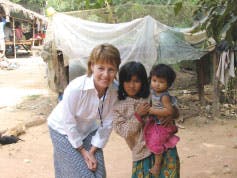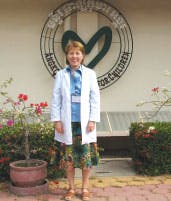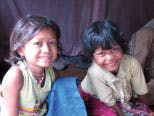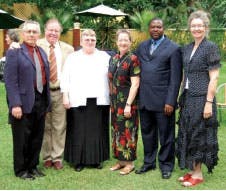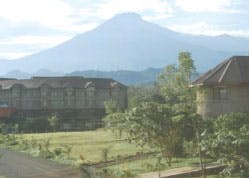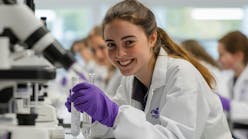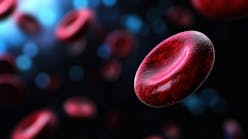A few years ago, when I received a small inheritance, I
decided to fulfill a lifelong dream. While my many years working in
hospital lab environments had taught me much about diagnostic testing,
my experience with volunteer work taught me just as much about the
hardships some people face through the bad luck of being born poor.
Now, I had the chance to put the two together and
make a difference. When I read that Angkor Hospital for Children (AHC)
in Siem Reap, Cambodia, needed lab volunteers for stints of a week or
more, offered free room and board, and was close to “civilization”
(meaning an airport), I knew this was the opportunity I had been looking
for.
Angkor Hospital for Children was established in the
early 1990s as the first academic pediatric hospital in Cambodia. AHC’s
dedicated medical staff has the enormous challenge of providing medical
care to impoverished children with chronic malnutrition and diseases
such as AIDS, tuberculosis, and malaria. In a country with no health
insurance, few government-supported social services, high levels of
illiteracy, and isolation in rural communities with no transportation,
children frequently do not arrive at the hospital until they are sick
enough to require intensive-care treatment.
Digging in
Tourists come to Siem Reap to visit Angkor Wat, built in the early 12th century as a state temple and capital city. The temple has been partially
restored and remains a religious center for both Hinduism and Buddhism.
I was eager to get started as soon as I arrived, but
the incredible heat and humidity almost knocked me flat as soon as I
stepped off the plane. I immediately realized that my first day would be
difficult — and brief. My trip to Cambodia took more than 24 hours,
giving me a serious case of jet lag, so after I was introduced to the
lab crew and given a tour of the lab, I headed back to the guest
quarters for a few hours of sleep.
During my nearly three-week stay, my job was to
consult with the laboratory staff about some problematic practices.
Khmer, the official language of Cambodia, is the most challenging
language I have ever attempted to learn, so I could only communicate
effectively in English. The lab manager, who spoke and wrote some
English, told me he needed help with some microbiology and biochemistry
procedures.
The techs at Angkor Hospital for Children receive a
good technical school education in Cambodia and work diligently six days
a week. The lab offered very basic hematology, chemistry, microbiology,
serology, urinalysis, and blood banking services — with an emphasis on
basic. Some of the instrumentation was very old; the lab started
in the 1990s with donated used equipment, and the techs still used most
of this older instrumentation since there was no money for replacements.
Due to the problems inherent in performing tests on aged, poorly
behaving instruments, AHC’s lab was in desperate need of new
instrumentation. I wrote to the hospital board of trustees outlining the
problems with the current biochemistry instrumentation, arguing the need
for new equipment. After I got back home, I learned that the letter I
wrote to the AHC hospital board ended up in the hands of a generous
donor, who contributed the funds to purchase a new biochemistry analyzer
for the hospital lab.
AHC’s lab had only a couple of basic computers, which
were used just to record simple patient data. There was no air
conditioning, and space was at a premium. Blood donors, for example,
were frequently drawn in a room that served as storage, the lab
manager’s office, a break room, and the distilled water preparation
area.
The lab also needed help with the overall quality
assurance (QA) and daily quality control (QC) programs, which turned out
to be a difficult task. The language barrier prevented me from
explaining the benefits of performing daily QC and having a solid
overall QA program in place. I saw evidence of previous attempts by past
volunteers to put a good program in place; but for the most part, their
instructions were not followed consistently by the lab staff. While the
medical director was aware of the need to provide more oversight and
enforce such programs, like all physicians at AHC, he was an overworked
clinician with an overwhelming patient workload, so he simply did not
have the time.
A recent MLO interview on the globalization of
the medical lab (March 2009, p. 30) hit on the very essence of a
reluctance to accept and embrace standardized practices worldwide.
Without the need to pass inspections required to obtain reimbursement
for services, with language barriers that prevent the understanding of
standards, and without other local programs to emulate, there is no true
interest in following any written internal QC “requirements” or adopt a
QA program.
A world apart
Karen Mann McHugh used her vacation time to travel to Cambodia to become a lab volunteer for Angkor Hospital for Children, where the laboratory operated with donated equipment.
While I was mentally prepared for much of what I saw
in the laboratory, nothing could have prepared me for what I observed
around the hospital. Day after day, tremendous numbers of sick children
arrived, dressed in rags. Families sat patiently outside the triage
clinic on hard benches in the open courtyard for hours waiting to be
seen. While this was often disheartening for me, most of them still
offered me a smile when I walked by. Inside the non-air conditioned
hospital, the beds were made of thin foam pads on metal frames without
guardrails. Monitoring equipment was scarce. Almost every
patient-supporting device we are accustomed to in American hospitals was
absent. But, I was surprised and happy to see a true interest in
accurate patient identification at the bedside. The patient ID practices
I saw when visiting the wards at AHC were perfect.
The mix of 21st-century technology with overwhelming
poverty in Cambodia was surreal. Multitudes of Cambodians live in homes
that float on the water, with the larger structures serving as community
centers and health clinics. I visited one of the floating health clinics
on Tonle Sap Lake, where portable medical equipment was carried by small
power boats to what looked like nothing more than a large floating raft.
A growing number of Internet cafes crowded with cell-phone-carrying
locals lined the dusty dirt streets of Siem Reap. New motorcycles
streaked by, followed by old trucks carrying a number of people, pigs,
and petrol bottles. Tourists from around the world come to Siem Reap to
visit nearby Angkor Wat, said to be the largest religious monument in
the world.
Helping hands
Because the hospital was is in need of so many
supplies, I wanted to bring some needed supplies with me. Once word got
out to the laboratorians of Rhode Island Hospital where I worked, as
well as to friends and relatives, that I was collecting things to bring,
supplies came pouring in. Many generous people donated money for
medicines, lab supplies, surgical supplies, and toys for the children.
While I was in Cambodia, I realized that generosity comes from many
places. During a home healthcare visit in a village near Siem Reap, I
asked where the medications came from for the children infected with
HIV. I was told that they came from “Bill Clinton.” It took me a moment
to realize they meant the William J. Clinton Foundation, which receives
contributions from governments, companies and individuals from around
the world.
While I enjoyed my experience at Angkor Hospital for
Children, I have no immediate plans to return to Siem Reap — mostly
because I have to accumulate vacation time to go on such a long trip. In
the meantime, I am helping another lab in need from right here at home.
I am working with Dr. Walter (Sunny) Dzik at Massachusetts
General Hospital in Boston to obtain lab supplies for Mulago Hospital in
Kampala, Uganda. The pediatric lab at Mulago is basically empty, and
while physicians and nurses are accustomed to working with no diagnostic
instrumentation, I hope to help Mulago Hospital the way so many have
helped Angkor Hospital for Children.
Karen Mann McHugh, MEd, BB(ASCP),
is a clinical trials specialist for a laboratory instrumentation company
and lives in Massachusetts.
Information on how to help Angkor Hospital for Children in Siem Reap
is available at www.angkorhospital.org.
To learn more about helping Mulago Hospital’s
pediatric laboratory, go to www.cd36malaria.org.
CLSI members share best practices around the world
CLSI mentors Anthony LaPorta at left, Michael Noble, Donna Watsky, Pamela Melcher, Patrick Mateta, and Barb Unger volunteer -globally.
Quality laboratory testing is an integral element of
the clinical diagnostic scheme, infectious disease surveillance, and
public health. Following Clinical and Laboratory Standards Institute
(CLSI) protocols can help change the course of disease diagnosis and
prevention, treatment, and ultimately improve life expectancy. As part
of its Global Health Partnerships, CLSI offers technical assistance in
essential laboratory services capacity building to many
resource-constrained countries.
During the past few years, CLSI volunteers and staff
have provided technical assistance in Tanzania, Namibia, Cote d’Ivoire,
and Mali, with plans to expand the laboratory strengthening to Ethiopia
and Nigeria. The process takes time and the commitment of volunteers and
in-country laboratory professionals dedicated to making a difference,
says Patricia Rizzo-Price, vice president of CLSI Global Health
Partnerships.
Taking on the task of implementing a quality plan in
a foreign laboratory can seem daunting. “It is overwhelming to think of
millions of people in desperate need of assistance; but at the same
time, it is encouraging to remember that every journey begins with the
first step, and that step by step and day by day, you can make a
difference,” says Barb Unger, a CLSI volunteer who worked in Dar-es-Salaam,
Tanzania.
As a volunteer-driven, non-profit organization
dedicated to developing standards and guidelines for the healthcare and
medical-testing community, CLSI offers support to laboratories in need
of quality improvements. CLSI’s process facilitates the creation of
standards and guidelines that are reliable, practical, and achievable
for an effective quality system, and they represent the “best practices”
in laboratory testing. “We worked with the Tanzanian laboratorians to
improve and enhance laboratory standards and promote good practice in
their laboratories,” says Unger.
Tanzania is only one of the countries in which CLSI volunteers work to enhance laboratory standards.
CLSI’s work involves assessments, training, and
implementation. First, preliminary meetings with in-country partners are
held. Then, a gap analysis is conducted, and training modules are
provided. Finally, mentoring, self-assessment tools and ongoing advisement are offered. “The engine that
makes it all work is our amazing volunteers. We have a dedicated group
of international volunteers who are both talented and committed to
making a difference,” says Rizzo-Price.
“Improving the quality of clinical laboratories will
most assuredly improve the quality of health care in developing
countries,” says Anthony LaPorta, a CLSI Global Health Partnerships
volunteer who worked at Kilimanjaro Christian Medical Center, Moshi,
Tanzania.
Acting as a mentor and educator for the laboratory,
Donna Watsky, a CLSI volunteer who worked in Mbeya, Tanzania, says she
watched those with whom she worked take ownership of the laboratory
quality plan and, eventually, move the project forward on their own.
“It was my job to encourage and guide the staff to
develop a quality plan and give them advice,” Watsky says. “I have great
confidence in the laboratory folks in Mbeya, and I expect to see
implementation move ahead. In the United States, we did it little by
little; in Santo Domingo, poco a poco; and in Tanzania, pole
pole. Now the program belongs to the laboratory to carry out.”
For more information about CLSI’s volunteer program,
visit www.clsi.org.

